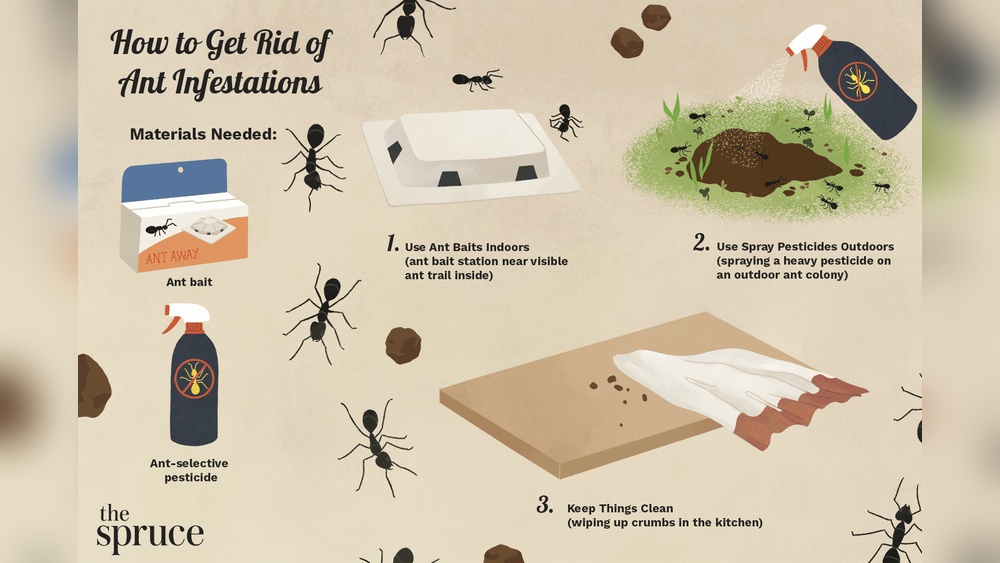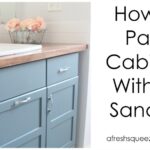Are ants invading your kitchen and ruining your peace? You’re not alone, and the good news is—there’s a way to stop them.
These tiny intruders are drawn to your kitchen because it offers everything they need: food, water, and shelter. But you don’t have to let them take over your space. By understanding what attracts ants and how to cut off their access, you can reclaim your kitchen quickly and effectively.
Keep reading, and you’ll discover simple, practical steps that will help you get rid of ants for good—and keep them from coming back.
:max_bytes(150000):strip_icc()/SPR-how-to-get-rid-of-ants-in-your-kitchen-7558011-430413987c7f4b868c822314335f0d45.jpg)
Ants In The Kitchen
Ants are common in many homes. Common indoor ant species include odorous house ants, pavement ants, and carpenter ants. These ants can be seen crawling on counters, floors, and near sinks.
Kitchens attract ants due to easy access to food, water, and shelter. Small crumbs, spilled sugar, and sticky residues act as a magnet for them. Ants especially love sweet and greasy foods. Leaving pet food out also invites ants.
Water sources like leaky pipes, wet sinks, or standing water in dishwashers attract ants. High kitchen humidity also makes a perfect environment for ants to live.
Ants enter through tiny cracks and gaps around doors, windows, and walls. Once one ant finds food, it leaves a chemical trail for others to follow, quickly leading to more ants.
Ant Attractants
Ants are drawn to food sources like crumbs, sticky spills, and sugary items. Even tiny bits of food left on counters or floors can attract them. Pet food left out is also a common lure. Keeping food sealed and surfaces clean helps reduce this attraction.
Water and moisture spots are another big attractant. Ants seek out leaks under sinks, damp areas, and standing water in dishwashers. High humidity in the kitchen can also invite ants. Fixing leaks and drying wet spots stops their water supply.
Shelter and entry points let ants enter and hide in your kitchen. Cracks, gaps around doors, and windows offer easy access. Cluttered areas provide good hiding spots. Sealing entry points and reducing clutter makes the kitchen less inviting to ants.
Preventing Ant Infestations
Clean all kitchen surfaces regularly to remove crumbs and spills. Store food in airtight containers to prevent ants from smelling it. Avoid leaving pet food out for long periods.
Fix any leaky pipes or faucets to cut off water sources. Use a dehumidifier or open windows to reduce humidity in the kitchen. Ants thrive in damp places.
Seal cracks around windows, doors, and baseboards using caulk or weather stripping. Check walls and cabinets for gaps where ants enter. Blocking these entryways stops new ants from coming in.
Natural Remedies
Vinegar and water spray works well to deter ants. Mix equal parts vinegar and water in a spray bottle. Spray this solution on countertops and entry points. The strong smell confuses ants and masks their scent trails. It is safe to use around food areas and pets.
Baking soda mixtures help kill ants naturally. Combine baking soda with powdered sugar in a 1:1 ratio. Sprinkle this mix near ant trails and nests. The sugar attracts ants, and baking soda reacts with their stomach acid, killing them. Keep this away from children and pets.
| Essential Oil | Effect on Ants | How to Use |
|---|---|---|
| Peppermint oil | Repels ants with a strong smell | Mix 10 drops with water and spray |
| Lemon oil | Disrupts ants’ scent trails | Apply on entry points or wipe surfaces |
| Tea tree oil | Acts as a natural insecticide | Use diluted oil to clean kitchen areas |
Using Ant Baits
Ant baits contain poison mixed with food that ants like. Worker ants take the bait back to the nest. This helps to kill the whole colony, not just the ants you see.
Place baits near ant trails, walls, and places ants enter. Keep baits away from children and pets for safety. Avoid cleaning the area around the bait so ants keep finding it.
Patience is key. Ants need time to carry the bait to the nest. Do not spray insecticide near baits; this can stop ants from taking the bait.
Chemical Treatments
Choose safe indoor pesticides labeled for kitchen use. These products kill ants quickly without harming family or pets. Always read instructions carefully before applying. Spray along ant trails and entry points for best results. Avoid spraying near food or utensils. Use baits to attract ants; they carry poison back to the nest, killing the colony over time.
Call a professional if ants keep coming back despite treatments. Experts can find hidden nests and use stronger solutions safely. They also offer advice on preventing future infestations. Large infestations or allergies to chemicals are good reasons to seek professional help. Quick action helps protect your kitchen from damage and contamination.
Maintaining An Ant-free Kitchen
Maintaining an ant-free kitchen starts with regular cleaning habits. Wiping counters daily removes crumbs and sticky spots that attract ants. Sweeping or vacuuming floors often helps stop ants from finding food. Keep food in sealed containers to block access. Empty trash bins frequently to avoid smells that lure ants.
Monitoring and early detection is key. Watch for small ant trails near windows, doors, or cracks. Using a flashlight at night can help spot ants moving. Catching ants early stops a big problem later. Fix any leaks or moisture issues, as ants need water too.


Frequently Asked Questions
What Is The Best Homemade Ant Killer For The Kitchen?
The best homemade ant killer uses equal parts baking soda and powdered sugar. Sugar attracts ants; baking soda kills them effectively. Sprinkle the mix near ant trails and entry points. Repeat regularly for best results.
Why Are There So Many Ants In My Kitchen?
Ants swarm your kitchen searching for food, water, and shelter. Crumbs, spills, leaks, and entry cracks attract them. Scout ants leave scent trails, leading others inside.
How Do You Get Rid Of Ants Permanently?
Clean food crumbs and spills immediately. Fix leaks and moisture. Seal entry cracks. Use ant bait stations to kill colonies. Wipe trails with vinegar solution regularly.
What Smell Do Ants Hate?
Ants hate strong smells like vinegar, peppermint, lemon, cinnamon, and coffee grounds. These scents repel and disrupt their trails.
Conclusion
Ants in the kitchen can be a persistent problem. Keep your counters clean and dry at all times. Store food in sealed containers to block their access. Fix leaks and remove standing water quickly. Wipe away ant trails with vinegar and water.
These simple steps reduce their attraction and entry points. Stay consistent with cleaning to prevent future infestations. A tidy kitchen keeps ants away for good.

Yes, working as , Food Blogger and Product Reviewer for last 6 years. Here you will get amazing deals for Smart kitchen products. I am your best source for the latest update in cooking trends. I provide insightful articles, reviews, and analysis on cutting-edge kitchen gadget. My mission is to empower readers with the knowledge they need to stay ahead in a rapidly evolving coking world. Join me as we explore the future of food technology and how it shapes our lives today and tomorrow.





